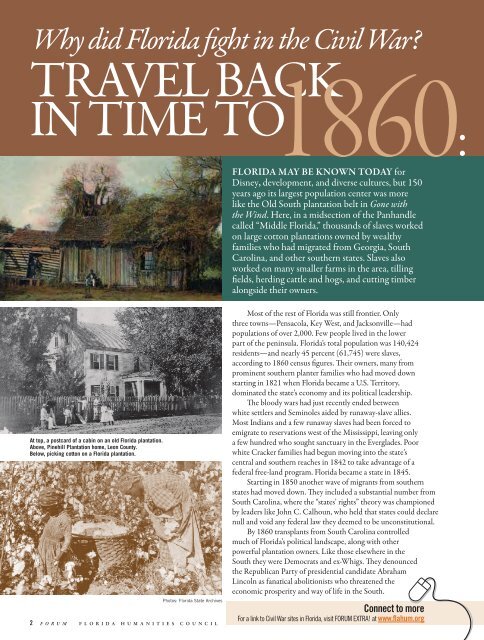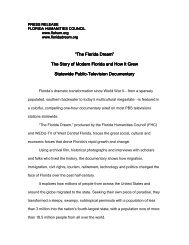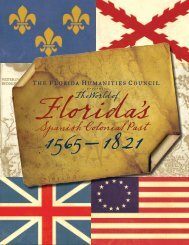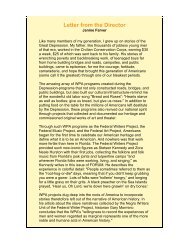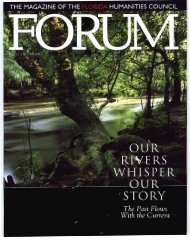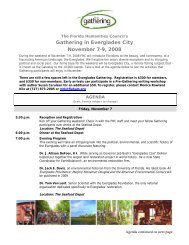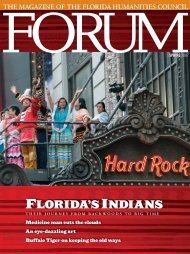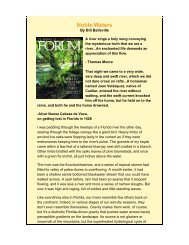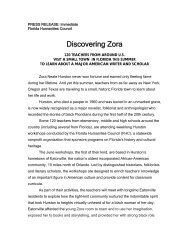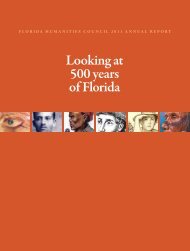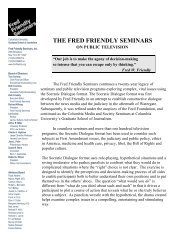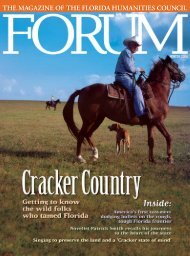when florida “Opened up the gates of hell” - Florida Humanities ...
when florida “Opened up the gates of hell” - Florida Humanities ...
when florida “Opened up the gates of hell” - Florida Humanities ...
Create successful ePaper yourself
Turn your PDF publications into a flip-book with our unique Google optimized e-Paper software.
Whydid<strong>Florida</strong>fightin<strong>the</strong>CivilWar?<br />
Travel back<br />
in Time To1860:<br />
FLORIDA MAy bE kNOwN TODAy for<br />
Disney, development, and diverse cultures, but 150<br />
years ago its largest population center was more<br />
like <strong>the</strong> Old South plantation belt in Gone with<br />
<strong>the</strong> Wind. Here, in a midsection <strong>of</strong> <strong>the</strong> Panhandle<br />
called “Middle <strong>Florida</strong>,” thousands <strong>of</strong> slaves worked<br />
on large cotton plantations owned by wealthy<br />
families who had migrated from Georgia, South<br />
Carolina, and o<strong>the</strong>r sou<strong>the</strong>rn states. Slaves also<br />
worked on many smaller farms in <strong>the</strong> area, tilling<br />
fields, herding cattle and hogs, and cutting timber<br />
alongside <strong>the</strong>ir owners.<br />
At top, a postcard <strong>of</strong> a cabin on an old <strong>Florida</strong> plantation.<br />
Above, Pinehill Plantation home, Leon County.<br />
Below, picking cotton on a <strong>Florida</strong> plantation.<br />
Photos: <strong>Florida</strong> State Archives<br />
2 F O R U M F L O R I D A H U M A N I T I E S C O U N C I L<br />
Most <strong>of</strong> <strong>the</strong> rest <strong>of</strong> <strong>Florida</strong> was still frontier. Only<br />
three towns—Pensacola, Key West, and Jacksonville—had<br />
populations <strong>of</strong> over 2,000. Few people lived in <strong>the</strong> lower<br />
part <strong>of</strong> <strong>the</strong> peninsula. <strong>Florida</strong>’s total population was 140,424<br />
residents—and nearly 45 percent (61,745) were slaves,<br />
according to 1860 census figures. Their owners, many from<br />
prominent sou<strong>the</strong>rn planter families who had moved down<br />
starting in 1821 <strong>when</strong> <strong>Florida</strong> became a U.S. Territory,<br />
dominated <strong>the</strong> state’s economy and its political leadership.<br />
The bloody wars had just recently ended between<br />
white settlers and Seminoles aided by runaway-slave allies.<br />
Most Indians and a few runaway slaves had been forced to<br />
emigrate to reservations west <strong>of</strong> <strong>the</strong> Mississippi, leaving only<br />
a few hundred who sought sanctuary in <strong>the</strong> Everglades. Poor<br />
white Cracker families had begun moving into <strong>the</strong> state’s<br />
central and sou<strong>the</strong>rn reaches in 1842 to take advantage <strong>of</strong> a<br />
federal free-land program. <strong>Florida</strong> became a state in 1845.<br />
Starting in 1850 ano<strong>the</strong>r wave <strong>of</strong> migrants from sou<strong>the</strong>rn<br />
states had moved down. They included a substantial number from<br />
South Carolina, where <strong>the</strong> “states’ rights” <strong>the</strong>ory was championed<br />
by leaders like John C. Calhoun, who held that states could declare<br />
null and void any federal law <strong>the</strong>y deemed to be unconstitutional.<br />
By 1860 transplants from South Carolina controlled<br />
much <strong>of</strong> <strong>Florida</strong>’s political landscape, along with o<strong>the</strong>r<br />
powerful plantation owners. Like those elsewhere in <strong>the</strong><br />
South <strong>the</strong>y were Democrats and ex-Whigs. They denounced<br />
<strong>the</strong> Republican Party <strong>of</strong> presidential candidate Abraham<br />
Lincoln as fanatical abolitionists who threatened <strong>the</strong><br />
economic prosperity and way <strong>of</strong> life in <strong>the</strong> South.<br />
Connect to more<br />
For a link to Civil War sites in <strong>Florida</strong>, visit FORUM EXTRA! at www.flahum.org


